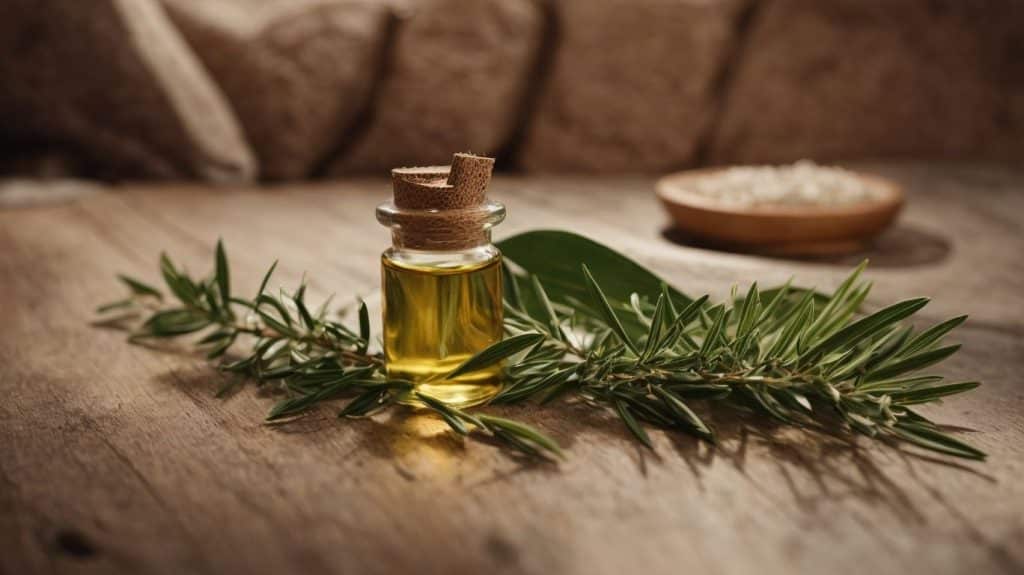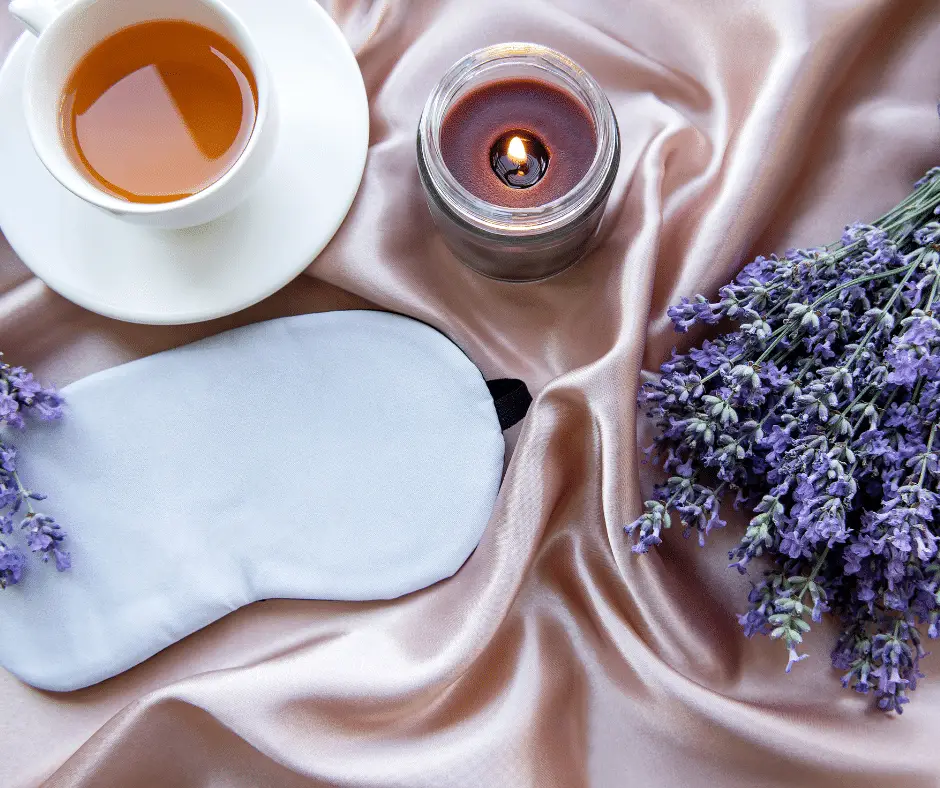Tea tree oil, also known as melaleuca oil, is a popular essential oil known for its antiseptic properties. It is derived from the leaves of the tea tree, scientifically known as Melaleuca alternifolia, and has been used for centuries to treat various skin conditions and infections.
The active compound in tea tree oil, terpinen-4-ol, is believed to be responsible for its antimicrobial properties. This same compound also makes tea tree oil an effective treatment for lice.
When applied to the hair and scalp, tea tree oil suffocates lice by coating their breathing holes and disrupting their ability to survive. It also has insecticidal properties that can kill lice and their eggs.
Several studies have been conducted on the effectiveness of tea tree oil against lice, with promising results. In a study published in the International Journal of Dermatology, tea tree oil was found to be significantly more effective than a placebo in treating lice and reducing the number of viable eggs.
To use tea tree oil for lice treatment, mix a few drops of the oil with a carrier oil, such as coconut or olive oil. Apply the mixture to the hair and scalp, making sure to cover all areas. Leave it on for at least 30 minutes before washing it out. Repeat this process every few days until the lice are gone.
While tea tree oil is generally safe to use, it is important to take precautions when using it for lice treatment. Always dilute the oil before use and do a patch test to check for any allergies. Avoid using tea tree oil on children under the age of 6 and pregnant or nursing women.
Aside from its use as a lice treatment, tea tree oil has many other benefits. It can be used to treat other insect infestations such as fleas and ticks. It is also popular in skincare due to its ability to soothe and treat various skin conditions, and in hair care for its moisturizing and anti-inflammatory properties.
However, it is important to note that tea tree oil can cause skin irritation, especially in those with sensitive skin. It may also interact with certain medications, so it is best to consult with a doctor before using it.
In conclusion, tea tree oil can be an effective and natural treatment for lice. However, it is important to use it safely and carefully to avoid any adverse reactions. If used correctly, tea tree oil can be a safe and effective alternative to chemical treatments for lice.
Key Takeaways:
- Tea tree oil is a natural essential oil that is known for its antimicrobial and insecticidal properties.
- Studies have shown that tea tree oil can effectively kill lice and their eggs, making it a popular alternative to chemical treatments.
- When using tea tree oil for lice treatment, it is important to follow proper dilution and safety precautions to avoid any potential side effects.
What is Tea Tree Oil?
Tea tree oil is an essential oil extracted from the leaves of the tea tree plant, scientifically known as Melaleuca alternifolia. This plant is native to Australia and has been utilized for centuries by the indigenous people for its medicinal properties. Due to its numerous health benefits, tea tree oil has gained popularity worldwide.
One of the main reasons for its popularity is its antimicrobial and anti-inflammatory properties, which make it effective in treating various skin conditions such as acne, psoriasis, and eczema. It is also commonly used as a natural remedy for dandruff and fungal infections like athlete's foot.
Aside from its skincare benefits, tea tree oil is also a popular choice for insect repellent and for its soothing effects. For a relaxing and rejuvenating experience, it can be diluted and applied topically or added to bath water.
However, it is important to note that tea tree oil should always be diluted before use, as it can cause skin irritation if used directly. It is also recommended to do a patch test before using it on a larger area of the skin.
Overall, tea tree oil is a versatile and natural remedy with a wide range of uses and benefits that make it a popular choice among individuals seeking alternative and natural solutions.
How Does Tea Tree Oil Work Against Lice?
Tea tree oil is known for its insecticidal properties and its ability to suffocate and kill lice and their eggs, making it a popular choice for lice treatment. Follow these steps when using tea tree oil to combat lice:
- Choose a high-quality, pure and undiluted tea tree oil product.
- Dilute the tea tree oil with a carrier oil, such as coconut oil or olive oil, before applying it to the scalp.
- Apply the diluted tea tree oil mixture to the scalp and hair, focusing on areas where lice and eggs are most likely to be present.
- Gently massage the mixture into the scalp and leave it on for at least 30 minutes or overnight.
- Use a fine-toothed comb to carefully comb through the hair, removing any lice or eggs.
- Repeat the process every few days for a couple of weeks to ensure all lice and eggs are eliminated.
- Wash all bedding, clothing, and personal items that may have come into contact with lice to prevent reinfestation.
Remember to perform a patch test before using tea tree oil to ensure there is no allergic reaction. If the infestation persists or worsens, it is important to consult a healthcare professional for further guidance.
Is Tea Tree Oil Effective in Killing Lice?
Tea tree oil is renowned for its potential effectiveness in eliminating lice. Numerous studies have demonstrated its insecticidal properties, making it a popular natural remedy for lice infestations. The oil contains compounds that have the ability to suffocate and eradicate lice, including their eggs (nits). However, it is important to note that tea tree oil should not be used as the sole treatment for lice. It is most effective when used in conjunction with other lice treatments, such as combing with a fine-toothed nit comb or using over-the-counter lice shampoos.
Before applying it to the scalp, the oil should always be diluted, as pure tea tree oil can cause skin irritation. Additionally, it is not recommended for use on children under the age of two, as it can be toxic if ingested.
What Studies Have Been Done on Tea Tree Oil and Lice?
Numerous studies have been conducted to investigate the effectiveness of tea tree oil in treating lice infestations. One particular study, published in the Medical Journal of Australia, examined the efficacy of various treatments, including tea tree oil, in killing head lice. The results of this study showed that tea tree oil was successful in reducing the number of lice and eggs.
Another study, conducted by the School of Public Health in Australia, compared the effectiveness of tea tree oil to the commonly used lice treatment, permethrin. This study concluded that tea tree oil was just as effective in killing lice and preventing their reinfestation.
Furthermore, a study published in the International Journal of Dermatology reported that tea tree oil had a significant impact on lice mortality, indicating its potent insecticidal properties.
These studies provide strong evidence of the effectiveness of tea tree oil in combating lice infestations and support its use as a natural alternative to traditional lice treatments.
How to Use Tea Tree Oil for Lice Treatment?
Tea tree oil can be a highly effective natural remedy for lice treatment. Follow these steps to properly use tea tree oil:
- Mix tea tree oil with a carrier oil such as coconut oil or olive oil, using a ratio of 10-20 drops of tea tree oil per ounce of carrier oil.
- Apply the mixture to the scalp, focusing on the areas affected by lice.
- Gently massage the mixture into the scalp for a few minutes to ensure proper penetration.
- Cover the head with a shower cap or towel and leave the mixture on for at least two hours or overnight.
- After the recommended duration, use a fine-toothed comb to comb through the hair and remove any dead lice and nits.
- Wash the hair with a mild shampoo to remove any oily residue.
- For best results, repeat this process every few days for a couple of weeks to ensure complete eradication of lice.
Pro-tip: To enhance the effectiveness of tea tree oil, add a few drops of lavender or eucalyptus oil to the mixture. These oils have insect-repellent properties that can help prevent future lice infestations.
Are There Any Precautions to Take When Using Tea Tree Oil for Lice Treatment?
When using tea tree oil for lice treatment, it is important to take certain precautions to ensure safe and effective use. Firstly, tea tree oil should never be ingested, as it can be toxic if swallowed. It should only be used externally on the scalp and hair. It is recommended to dilute tea tree oil with a carrier oil, such as coconut oil or olive oil, before applying it to the scalp. This helps to prevent skin irritation or allergic reactions.
Before applying tea tree oil to the entire scalp, it is advisable to perform a patch test on a small area of skin to check for any adverse reactions. If any redness, itching, or irritation occurs, discontinue use immediately.
It is important to follow the recommended dosage and application instructions provided by the manufacturer or a healthcare professional. Overuse or misuse of tea tree oil can lead to skin dryness, burning sensation, or scalp sensitivity.
What Are the Other Benefits of Tea Tree Oil?
When it comes to tea tree oil, its uses go beyond just killing lice. This natural essential oil has a variety of therapeutic properties that make it a popular choice among aromatherapy and skincare enthusiasts. Some other benefits of tea tree oil include:
- Antibacterial and antifungal properties: For centuries, tea tree oil has been used to treat various skin infections, such as acne, athlete's foot, and nail fungus.
- Anti-inflammatory properties: Tea tree oil can reduce inflammation and soothe skin conditions like eczema and psoriasis.
- Natural insect repellent: Instead of using chemical-laden insect repellents, tea tree oil can be used as a natural alternative. Its strong scent helps keep insects like mosquitoes and ticks away.
- Scalp and hair health: Tea tree oil can treat dandruff and dry scalp by moisturizing and soothing the skin. It can also promote hair growth and prevent hair loss.
- Household cleaner: Tea tree oil's antimicrobial properties make it a great addition to homemade cleaning solutions. It can disinfect surfaces and freshen up the air.
True story: A friend of mine had been struggling with acne for years. She decided to try tea tree oil as a natural remedy and was amazed by the results. Not only did her acne start to clear up, but her skin also looked healthier and more radiant. She continues to use tea tree oil in her skincare routine and swears by its beneficial properties.
Can Tea Tree Oil Be Used for Other Insect Infestations?
Tea tree oil, known for its antimicrobial properties, can be utilized to combat various insect infestations.
- For mosquitoes and flies: Create a mixture by combining a few drops of tea tree oil with water and use it as a natural repellent by spraying it around your home or on your body.
- For ants and spiders: Make a solution by mixing tea tree oil with water and vinegar, then spray it in areas where these pests are commonly found.
- For fleas and ticks: Add a few drops of tea tree oil to your pet's shampoo to help repel and eliminate these pests. Avoid using concentrated tea tree oil directly on pets as it may be harmful to them.
Pro-tip: Always dilute tea tree oil before using it as it is highly concentrated. Conduct a patch test before applying it to your skin or hair to check for any adverse reactions. Remember, tea tree oil should not be relied upon as a standalone treatment for severe infestations, and professional pest control may be necessary.
Can Tea Tree Oil Be Used for Skin and Hair Care?
Tea tree oil is not only effective against lice but also offers various benefits for skin and hair care. Thanks to its natural antiseptic properties, tea tree oil is commonly used to treat skin conditions like acne, eczema, and fungal infections. It can also help soothe scalp conditions such as dandruff and dryness.
When it comes to skin care, tea tree oil can be added to cleansers, moisturizers, or diluted with a carrier oil for direct application. Its antibacterial and anti-inflammatory properties make it useful for treating acne breakouts and reducing redness and inflammation.
For hair care, tea tree oil can be added to shampoos, conditioners, or used as a scalp treatment. It helps to remove impurities, moisturize the scalp, and promote healthy hair growth. Additionally, tea tree oil can be used to repel and treat other insect infestations such as lice, fleas, or ticks.
However, it's important to note that tea tree oil should be used in moderation and always properly diluted before applying to the skin or scalp to avoid irritation or allergic reactions. It is recommended to do a patch test before using tea tree oil for the first time.
What Are the Side Effects of Tea Tree Oil?
When utilizing tea tree oil, it is important to be mindful of potential side effects. Although tea tree oil is generally considered safe when used as directed, some individuals may experience adverse reactions.
Common side effects of tea tree oil include:
- skin irritation, allergic reactions, and contact dermatitis.
Skin irritation may present as redness, itching, or a burning sensation. Allergic reactions can range from mild to severe, with symptoms such as swelling, hives, or difficulty breathing. Contact dermatitis, which occurs when the oil comes into contact with the skin, can cause a rash or blisters.
It is also important to note that tea tree oil should not be ingested, as it can be toxic if swallowed. To minimize the risk of side effects, it is recommended to perform a patch test before using tea tree oil topically and to dilute it with a carrier oil.
If any negative reactions occur, discontinue use immediately and consult a healthcare professional. Pro-tip: If you experience any side effects after using tea tree oil, wash the affected area with mild soap and water, and seek medical attention if the symptoms persist or worsen.
Is Tea Tree Oil a Safe and Effective Treatment for Lice?
Tea tree oil is often recommended as a natural remedy for lice treatment, but there is ongoing debate about its effectiveness and safety. While some studies suggest that tea tree oil may have insecticidal properties that can kill lice, there is limited scientific evidence to support its use as a standalone treatment. It is important to note that tea tree oil should never be applied directly to the scalp, as it can cause skin irritation and allergic reactions.
If you are considering using tea tree oil as a treatment for lice, it is best to consult with a healthcare professional or licensed pharmacist. They can offer guidance on proper dilution and usage to ensure safe and effective treatment. It is also crucial to follow a comprehensive lice treatment plan that includes combing, washing bedding and clothing, and other necessary steps to prevent re-infestation.
Throughout history, people have tried various remedies to combat lice infestations. For instance, ancient Egyptians used a mixture of olive oil and sour wine as a treatment for head lice. This illustrates the ongoing search for effective lice treatments that has persisted for centuries.
Frequently Asked Questions
Will tea tree oil kill lice?
While tea tree oil has been used for centuries as a natural remedy, there is currently no scientific evidence to support its effectiveness in killing lice. Some studies have shown promising results, but more research is needed to confirm its insecticidal effect on lice.
Can tea tree oil lose effectiveness against lice?
There is a possibility that lice can develop resistance to tea tree oil, similar to how they can develop resistance to other treatments. More research is needed to determine its long-term efficacy and to develop novel pediculicides.
Is there a gel formula containing tea tree oil for lice treatment?
Some clinical trials have used a gel formula containing 1-10% tea tree oil for lice treatment, applied daily for up to four weeks. However, more research is needed to determine the appropriate dosage and efficacy of this treatment.
Can tea tree oil be used on prepubescent boys to treat lice?
While tea tree oil is generally well tolerated, repeated use may cause enlarged breast tissue in prepubescent boys. It is important to use caution and only apply it topically for lice treatment.
Is there any anecdotal evidence of tea tree oil being effective against lice?
Some people claim that tea tree oil has helped them get rid of lice. However, there is still a lack of reliable data and scientific research to support these claims. It is always best to consult with a doctor before using alternative therapies.
Is tea tree oil safe for preventing lice infestations?
The safety and effectiveness of tea tree oil for preventing lice is still uncertain. While it has been traditionally used for this purpose, there is not enough scientific evidence to support its efficacy. It is always best to use evidence-based methods, such as regular hair checks and avoiding sharing personal items, to prevent lice infestations.

.jpg)


